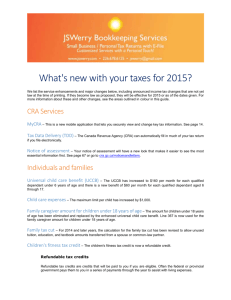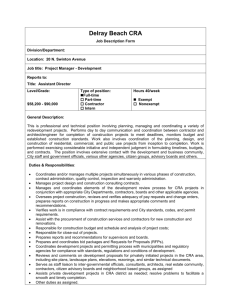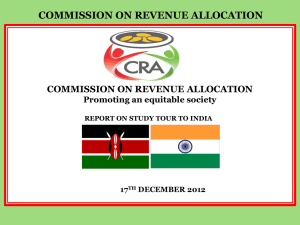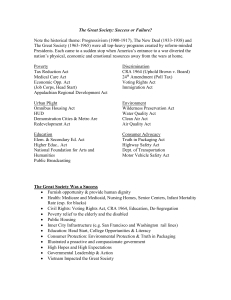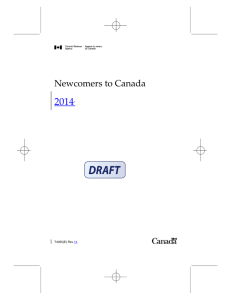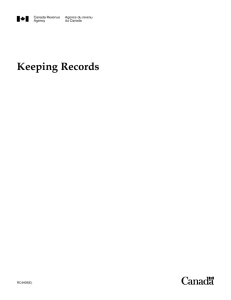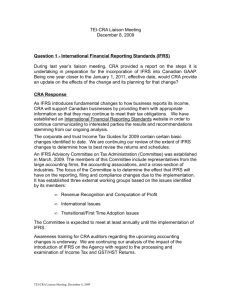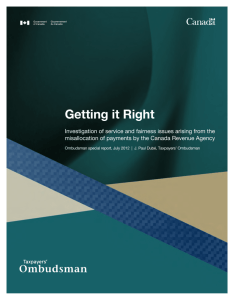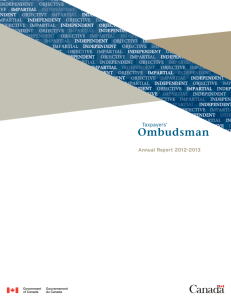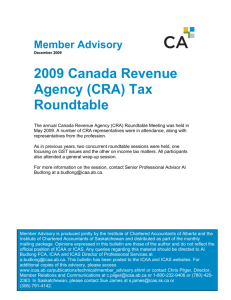What information does the Canada Revenue Agency
advertisement
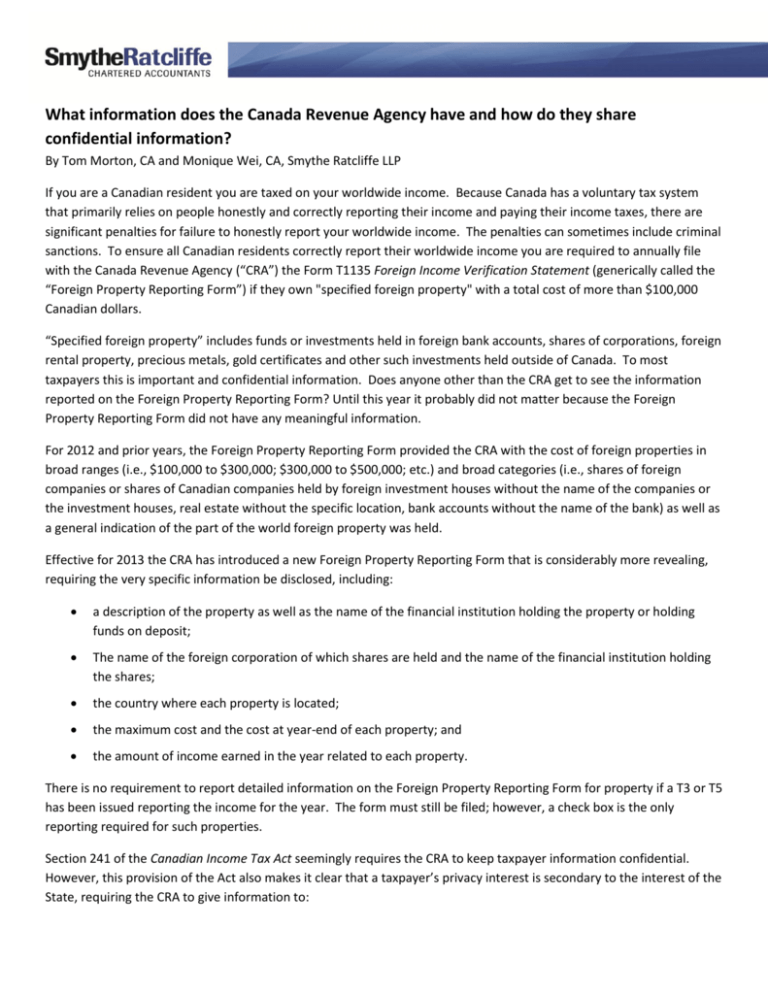
Foreign Property Reporting What information does the Canada Revenue Agency have and how do they share confidential information? By Tom Morton, CA and Monique Wei, CA, Smythe Ratcliffe LLP If you are a Canadian resident you are taxed on your worldwide income. Because Canada has a voluntary tax system that primarily relies on people honestly and correctly reporting their income and paying their income taxes, there are significant penalties for failure to honestly report your worldwide income. The penalties can sometimes include criminal sanctions. To ensure all Canadian residents correctly report their worldwide income you are required to annually file with the Canada Revenue Agency (“CRA”) the Form T1135 Foreign Income Verification Statement (generically called the “Foreign Property Reporting Form”) if they own "specified foreign property" with a total cost of more than $100,000 Canadian dollars. “Specified foreign property” includes funds or investments held in foreign bank accounts, shares of corporations, foreign rental property, precious metals, gold certificates and other such investments held outside of Canada. To most taxpayers this is important and confidential information. Does anyone other than the CRA get to see the information reported on the Foreign Property Reporting Form? Until this year it probably did not matter because the Foreign Property Reporting Form did not have any meaningful information. For 2012 and prior years, the Foreign Property Reporting Form provided the CRA with the cost of foreign properties in broad ranges (i.e., $100,000 to $300,000; $300,000 to $500,000; etc.) and broad categories (i.e., shares of foreign companies or shares of Canadian companies held by foreign investment houses without the name of the companies or the investment houses, real estate without the specific location, bank accounts without the name of the bank) as well as a general indication of the part of the world foreign property was held. Effective for 2013 the CRA has introduced a new Foreign Property Reporting Form that is considerably more revealing, requiring the very specific information be disclosed, including: a description of the property as well as the name of the financial institution holding the property or holding funds on deposit; The name of the foreign corporation of which shares are held and the name of the financial institution holding the shares; the country where each property is located; the maximum cost and the cost at year-end of each property; and the amount of income earned in the year related to each property. There is no requirement to report detailed information on the Foreign Property Reporting Form for property if a T3 or T5 has been issued reporting the income for the year. The form must still be filed; however, a check box is the only reporting required for such properties. Section 241 of the Canadian Income Tax Act seemingly requires the CRA to keep taxpayer information confidential. However, this provision of the Act also makes it clear that a taxpayer’s privacy interest is secondary to the interest of the State, requiring the CRA to give information to: other countries with which Canada has a tax treaty that authorizes the exchange of information, a Tax Information Exchange Agreement ("TIEA“), or a listed international agreement, which includes the Organization for Economic Co-operation and Development ("OECD") Agreement. Lists of the countries with which the CRA shares information about its taxpayers can be found at the following links: o List of countries with which Canada has a Tax Treaty o List of countries with which Canada has an TIEA o List of OECD Member countries Canadian government officials when it can reasonably be regarded as necessary for the purposes of the administration or enforcement of the Income Tax Act, the Canada Pension Plan, or the Employment Insurance Act and the Provincial Governments for purposes of the administration of the workers' compensation program; a government official for the purposes of formulation or evaluation of fiscal policy; a police officer or a Canada Customs officer for the purpose of investigating whether an offence has been committed under the Criminal Code; and “appropriate persons” if the information relates to the imminent danger of death or physical injury to any individual. We in no way condone not completing the Foreign Property Reporting Form to avoid having your information shared because failure to complete and file the Form as required can result in a penalty $25 per day up to a maximum of $2,500. If failure to file the Foreign Property Reporting Form was made knowingly or under circumstances that amount to gross negligence, the penalty increases to $500 per month up to a maximum of $24,000 or up to 5% of the total cost of the property that should have been reported. These penalties apply even if the income earned on the specified foreign property was properly declared and taxed on your personal tax return. Additional penalties can be assessed if you do not properly report and pay taxes on your worldwide income. Do not forget that on top of assessed penalties and income taxes there is interest which applies from the date the income tax or the penalty applies. The interest rate is currently 5% per annum. How will you get caught if you do not report foreign source income or fail to complete the Foreign Property Reporting Form? The countries with which Canada has a Tax Treaty or a TIEA are required to provide Canada with information about your foreign income and foreign property. Increasingly, non-governmental agencies, groups or individuals are accessing and disseminating information about foreign bank and investment accounts which the CRA is using. Do not think the CRA has only three years to find you and once the three years have passed you have avoided the penalties, income taxes and interest. Starting in 2013 the CRA has six years to find and reassess foreign source income and penalties for taxpayers that are required to file a Foreign Property Reporting Form. In addition, the CRA has an almost unlimited time to assess tax and penalties if failure to report the foreign income was due to fraud, misrepresentation or carelessness (carelessness does not need to be intentional). One final caution, although the CRA is essentially mandating tax returns be electronically filed (tax returns prepared by professional tax preparers must be electronically filed), the Foreign Property Reporting Form must still be paper filed. The filing deadline for the Foreign Property Reporting Form is April 30 or June 15 for self-employed individuals. If you have not filed a required Foreign Property Reporting Form in past years, it may be possible to get caught up on your filings and avoid penalties under the CRA's voluntary disclosure program. For more information about your foreign reporting requirements or the voluntary disclosure program, please contact us.


